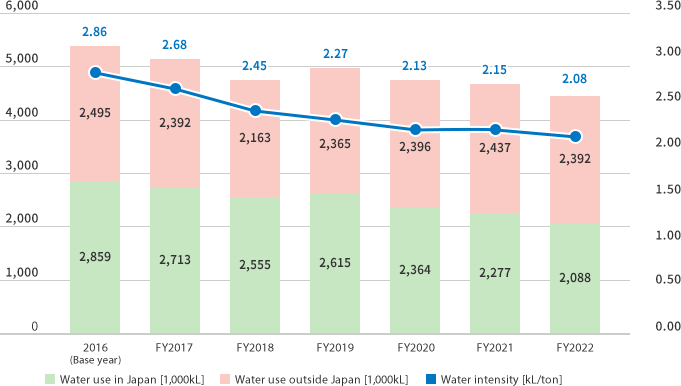Water Use Reduction
Material Issue
Water Resources
Management information
Relevance to our business
The Fuji Oil Group's business requires the use and discharge of water to grow crops in our supply chain and manufacture our products. We therefore recognize water stewardship as a material management issue.
Basic approach
Water shortages are intensifying around the world. Because of global warming, hundreds of millions of people will face rising water stress in the coming decades.*1 By 2080, an additional 1.8 billion people may no longer have access to the water they need.*2
The Fuji Oil Group aims to conserve water resources based on the Basic Policy of Environmental Integrity. Environmental Vision 2030*3 expresses our Group-wide commitment to make significant water use reductions by 2030.
We monitor water-related risks, which are unique to each site and implement necessary countermeasures to identify and correct the impact of our operations on water resources. To minimize the environmental impact of our water withdrawals and discharges, we manage water use based on the standards and regulations of each country or region in which we operate or based on our own, higher-level standards.
- Fuji Oil Group Basic Policy of Safety, Quality and Environment (PDF, 331KB)
- *1 Intergovernmental Panel on Climate Change (IPCC) Special Report on Global Warming of 1.5ºC
- *2 UNDP Human Development Report 2007/8
-
*3 https://www.fujioilholdings.com/en/sustainability/environmental_management/
Management system
The ESG Division Officer oversees initiatives in this area. The Sustainability Committee,*1 an advisory body to the Board of Directors, monitors the progress and results of initiatives as a material ESG issue.*2
Goals / Results
| 2030 targets*1 | FY2022 results*1 | Progress |
|---|---|---|
| 20% reduction in water intensity*2 (All Group companies) | 27% reduction | 135% |
- *1 Base year: 2016
- *2 Water use per unit of production
At least 90% complete At least 60% complete Less than 60% complete
| FY2022 Goals | FY2022 Results | Self-assessment |
|---|---|---|
| Start collecting environmental data in a timely manner using environmental data collection systems | Started running environmental data collection systems in collaboration with Group companies | |
| Deliberate and decide on new reduction targets | Investigation of the new target for reducing water usage has been postponed to the next fiscal year or later, along with investigation of the new target for reducing CO2 emissions | |
| Promote reduction efforts and pursue innovations | Raised awareness within the company through environmental audits at seven Group companies |
Analysis
Status of progress on 2030 targets
Water use intensity in FY2022 was 27% lower than baseline, an improvement of two points from the previous fiscal year's 25% reduction. This represents a 135% achievement rate relative to our 20% reduction target. Reduced production levels resulted in lower water usage compared to the previous year. In Japan, production facility cleaning methods were revised, which led to reductions in rinsing water use. Group companies outside Japan revised the cleaning frequency of production facilities and addressed water leaks. These actions all contributed to the reduction in water usage.
Actions taken for FY2022 targets
We carried out initiatives to achieve Environmental Vision 2030. Through online environmental audits, we explained the Vision and shared our approach to water conservation with Group companies. We also collected and analyzed data using the environmental data collection systems we introduced in FY2021. We plan to use the insights from this timely analysis to pursue further reductions going forward.
Annual water use and water intensity

Next step
- Investigate new reduction targets
- Promote ongoing reduction efforts and further enhance awareness of the water issue among employees
Specific initiatives
Risk management and countermeasures
The Fuji Oil Group manages water risks as one of many risks to our business. Water risks include water withdrawal, impact on water quality, storms, floods, and violations of wastewater regulations. To manage these risks, each Group company follows a PDCA cycle, which includes identifying material risks, planning and implementing a management strategy, evaluating results, and making improvements. We assess water risks in each region where Group companies have operations. This assessment takes into account Aqueduct* analysis results and is based on the Group's risk management system, which utilizes risk maps. This assessment helped us identify wastewater compliance risks at a Group company in China and flooding risk at a Group company in Indonesia as material risks. We are now implementing measures to prevent these risks from arising and to mitigate losses from risks that do occur.
- * A global water-risk mapping tool provided by the World Resources Institute (WRI)
Water conservation efforts at Group companies
Some examples of water conservation activities in FY2022 are as follows:
- At Fuji Oil Co., Ltd.'s Kobe Plant (Japan), steam traps were updated to energy-saving specifications to reduce the amount of supply water for boilers.
- At F&F Co., Ltd. (Japan), the temperature controlling water was changed to use water circulating tanks.
- At Fuji Oil (Zhang Jia Gang) Co., Ltd. (China), facilities were updated to reduce water usage in the refining process for oils and fats.
- At Harald Indústria e Comércio de Alimentos Ltda (Brazil), Blommer Chocolate Manufacturing (Shanghai) Company Ltd. (China), Fuji Oil Thailand Co., Ltd. and Palmaju Edible Oil Sdn. Bhd. (Malaysia), water leakage points in the production process were identified and repaired.